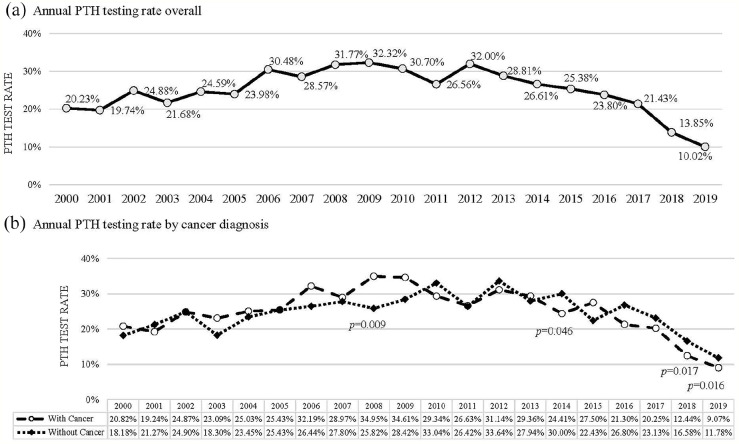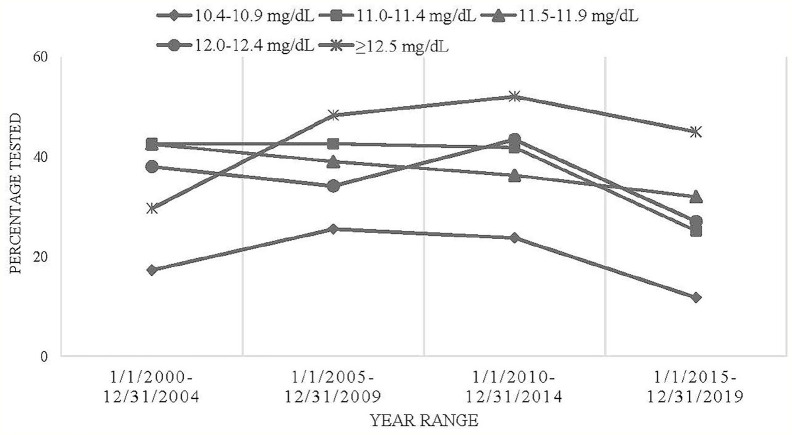甲状旁腺激素在高钙血症评价中的应用。在20年的20,954例患者数据集中有和没有恶性肿瘤病史的患者之间的比较
IF 2.7
Q3 ENDOCRINOLOGY & METABOLISM
Clinical Medicine Insights-Endocrinology and Diabetes
Pub Date : 2021-11-24
eCollection Date: 2021-01-01
DOI:10.1177/11795514211059494
引用次数: 1
摘要
背景:本研究的目的是评估先前的恶性诊断是否会影响高钙血症患者甲状旁腺激素(PTH)的评估,以及这种评估的比率是否随时间而改变。方法:设计一项回顾性队列研究,纳入2000年1月1日至2019年12月31日在马什菲尔德诊所卫生系统(MCHS)有或无恶性肿瘤病史的成年高钙血症患者。确定各组甲状旁腺激素评估的总体率和年率。在进行甲状旁腺激素评估的患者中,记录首次记录高钙血症和评估甲状旁腺激素之间血清钙水平升高的时间和次数,以及高钙血症的程度。结果:每组中约四分之一(23%)的患者进行了PTH评估。甲状旁腺激素的评估率最初随着时间的推移而增加,但后来显著下降。尽管高钙血症程度越严重,甲状旁腺激素评估的可能性越大,但在过去5年中,随着高钙血症程度的不同,评估率也在下降。虽然大多数接受甲状旁腺激素评估的患者在首次记录高钙血症的几个月内进行了评估,但不到一半(40%)的患者延迟了2年以上才得出甲状旁腺激素水平。结论:缺乏适当和及时的评估可能对两组患者的健康产生重大影响。迫切需要更好地教育提供者在评估高钙血症时适当和及时地评估甲状旁腺激素。本文章由计算机程序翻译,如有差异,请以英文原文为准。



Frequency of Parathyroid Hormone Assessment in the Evaluation of Hypercalcemia. A Comparison Between Patients With and Without a History of Malignancy in a 20-year Dataset of 20,954 Patients.
Background: The purpose of this study was to evaluate whether a prior diagnosis of malignancy affected the assessment of parathyroid hormone (PTH) in hypercalcemic patients and whether the rate of this assessment changed over time. Methods: A retrospective cohort study was designed that included adult patients with hypercalcemia with and without a history of malignancy between January 1, 2000 and December 31, 2019 in the Marshfield Clinic Health System (MCHS). The overall and annual rates of PTH assessment in each group was determined. In patients with a PTH assessment, duration of time and number of elevated serum calcium levels between the first documentation of hypercalcemia and the assessment of PTH were recorded, as was the degree of hypercalcemia. Results: Approximately a quarter (23%) of the patients in each group had a PTH assessment. The rate of PTH assessment initially increased over time but later declined significantly. Although a more severe degree of hypercalcemia predicted a greater probability of PTH assessment, the rate of assessment declined with all degrees of hypercalcemia in the last 5 years. While most patients who had a PTH assessed did so within a few months of the first documentation of hypercalcemia, less than half (40%) had a delay of more than 2 years before a PTH level was drawn. Conclusion: This lack of appropriate and timely assessment may have significant health consequences in both groups of patients. Better education of providers about the appropriate and timely assessment of PTH in the evaluation of hypercalcemia is urgently needed.
求助全文
通过发布文献求助,成功后即可免费获取论文全文。
去求助
来源期刊

Clinical Medicine Insights-Endocrinology and Diabetes
ENDOCRINOLOGY & METABOLISM-
CiteScore
4.30
自引率
0.00%
发文量
15
审稿时长
8 weeks
 求助内容:
求助内容: 应助结果提醒方式:
应助结果提醒方式:


